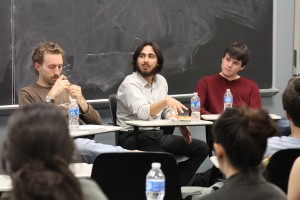CET advises students on graduate school
The Center for Excellence in Teaching held an event on Thursday to inform undergraduate students about how to apply to non-professional graduate school programs.
The event, Now You Know: How to Get Into Grad School, included a presentation about the application process and a question-and-answer session with a panel including graduate students and an undergraduate student who recently completed the application process.
Juvenal Cortes, a CET teaching assistant fellow, said the program wanted to familiarize undergraduates with graduate school.

Learn · The panel included Datton Combs, Ph.D. student, Neuroscience (left), Edson Rodriguez, a graduate student in sociology, and Christopher Hrvoj, a sophomore pursuing an M.D./Ph.D.
“The way we measure ourselves is to see what undergrads do after they graduate,” Cortes said. “We want to give information on what to expect, and we hope they can take away some preliminary knowledge. If you’re passionate about a topic and if you have skills, why not pursue it?”
The event emphasized how applications to graduate school largely focus on a specific degree program more than the university as a whole. Panelists also touched on the differences between doctoral programs, which typically lead to careers in academia, and master’s programs, which mainly apply knowledge to areas other than research, such as education.
Ana Lee, a pre-graduate school adviser in the Office of College Advising, said undergraduates should not underestimate the importance of maintaining their GPA and participating in research or an internship to prepare for graduate school. She also said students should talk to T.A.’s and professors who have been through the process.
“It’s never too early or too late to think about grad school. While an undergrad, you should take advantage of all opportunities to prepare yourself so you have the option to go if you decide to,” Lee said.
The Office of College Advising often recommends, depending on the profession, that students do not attend graduate school immediately after receiving their undergraduate degree so they can gain a greater understanding of how they can contribute to the field they wish to study, Lee said.
CET undergraduate fellow Michelle Tomkovicz said she wanted to host the event after realizing as a junior the complexity of the application process for graduate schools.
“The most common misunderstanding is that it’s similar to undergrad [applications],” Tomkovicz said. “Most students think you look at a school, you apply and you get in or you don’t. When it comes to grad school, it’s so much more personally oriented because it’s much like you are applying to a specific professor. They don’t want to take a chance on someone who isn’t organized.”
Desiree Romero, a junior majoring in psychology, said the event provided her with new information about the application process and degrees to pursue.
“At first I was more interested in how to go about [applying to graduate school],” Romero said. “I thought that I would do a master’s degree, but now I’m definitely considering a Ph.D.”
